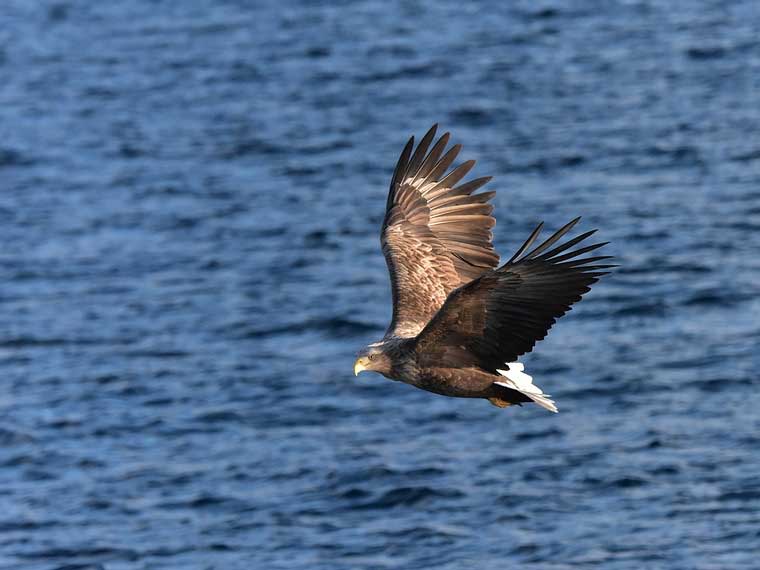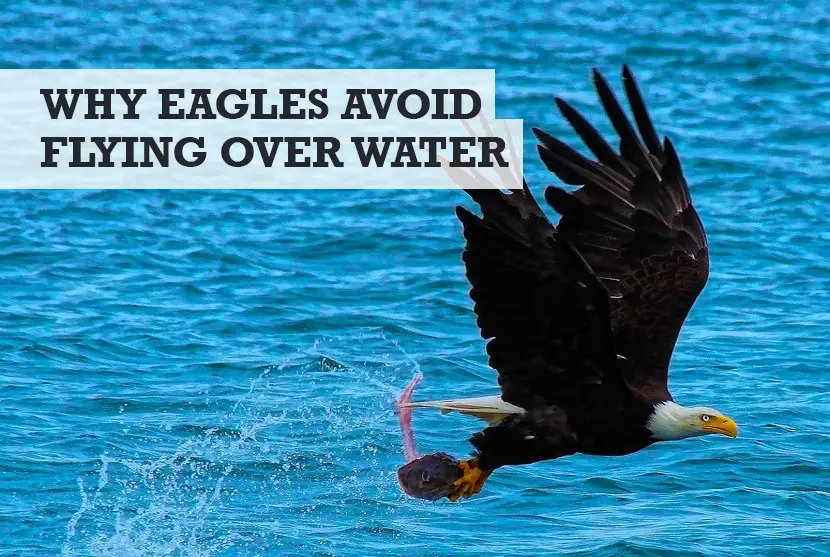The undeniable majesty of eagles has captured the attention of scientists and bird enthusiasts for years, many of whom dedicate their lives to learning how the winged hunter operates.
Many questions have been raised by observing them in their natural habitats, but there is one that has baffled experts in recent years which relates to why eagles avoid the sea and flying over water.
Why do eagles avoid flying over the water? Interestingly, the most straightforward answer is that most eagles will fly over water. Fish are at the top of the menu for many eagle species, meaning they hunt in water to survive.
Still, there have been instances where eagles have avoided flying over large bodies of water, like the sea, but for reasons unknown.
If you’re ready to solve the mystery, I have the information that can help. Read on to discover an interesting case involving an eagle that was deterred from flying over water for a full year, reasons why this may have happened, and how eagles that do consume fish hunt for their prey.
Reasons why eagles avoid flying over water
Despite being strong swimmers, a recent discovery revealed that eagles may experience scenarios in which a flight over water isn’t ideal.

In 2019, a young man in Saudi Arabia discovered a deceased steppe eagle with a GPS tracker attached to its body. It was soon discovered that this bird was just one of 20 steppe eagles that had been tagged and tracked since 2018.
The information on the tracker revealed everywhere the bird had travelled in a single year. It visited many Middle Eastern countries, but the eagle had never flown over any large body of water including the Caspian and Red seas. This finding stumped wildlife experts.
A definitive reason why the eagle steered from the water is still unknown, but many have speculated that it’s due to a couple of important factors.
Why do eagles avoid crossing the sea?
1. Thermal winds
According to Cornell University’s Bird Academy, thermals are generated when the sun hits the Earth’s surface, indirectly heating the air near the ground and causing it to rise.
Birds like eagles use this air to ride into the sky and remain there for extended periods without flapping their wings.
Since thermal winds are less common over water, flying long distances over the Red and Caspian seas would have expelled too much of the eagle’s energy, making land preferable – and being a good reason why eagles avoid flying over water.
Handy Hint: Thermal winds help eagles fly very high compared to other birds.
2. Particular diets
Eagles are not impartial to seafood, but most of a steppe eagle’s favorite meals are caught on land. They tend to have a taste for small mammals and reptiles. This could explain why the tagged eagle never flew out to sea to hunt.
Drinking water also would have been plentiful on the coasts surrounding the open seas, meaning the eagles wouldn’t need to fly far from the shore to quench their thirst.
Handy Hint: Did you know you can do some things to help attract bald eagles onto your property or yard to nest.
When will an eagle will fly over water then?
Many eagles will fly over water to hunt for fish and other marine life.
The Bald Eagle can consume one pound of fish in four minutes. While most of their diet has fins and gills, these incredible animals are also known to eat shorebirds, waterfowl, and turtles.
This means they can spend a sizable amount of time hovering over the water’s surface in search of a snack.
Handy Hint: Did you know bald eagles will often become scavengers in winter when they need to find alternative food sources?
How bald eagles hunt in water
When a Bald Eagle spots a fish near the water’s surface, it will skilfully approach its meal with a shallow glide. It uses its powerful talons to snatch prey and carry it off to feed.
This may seem simple enough, but there are dangers for a flying scavenger looming over large bodies of water.
It’s not uncommon for an eagle to pursue a fish that is too heavy for them to drag out of the water. In these instances, most eagles will cut their losses and release the fish. Others aren’t ready to give up so easily.
A persistent eagle may try to drag their prey back to shore by paddling, and many times, this technique is successful.
However, there are circumstances when the fish will drag the eagle underwater, drowning it. There’s also a chance that the eagle won’t be able to gain enough momentum to lift itself out of the water, which can be disastrous if the bird is far from shore or if the water is too cold.
More eagles that hunt over water
There are two genera and ten species of fish-eating eagles within the Accipitridae family. Each is closely associated with water habitats and is often seen on seacoasts or near inland bodies of water.
Here are some of the most better-known piscivores that you may be familiar with.
- White-Tailed Eagle: This raptor is Germany’s national bird and boasts the widest wingspan of any other eagle. They’re almost always found near a body of water since their diet consists mostly of fish.
- Steller’s Sea Eagle: This species is the largest of the fish eagles and is most found at the Kamchatka Peninsula in Russia. Their diet mainly consists of salmon, crabs, and squid.
- African Fish Eagle: These birds are synonymous with Africa’s inland waters and a strikingly stunning appearance. People say that hearing the piercing call of an African Fish Eagle means you are in a healthy environment.
- White-Bellied Sea Eagle: Frequently spotted on the coasts of Southeast Asia and Australia, this bird will breed and hunt by the water for a majority of its life.
- Grey-Headed Fish Eagle: Native to East Asia, these eagles have been known to catch fish in conditions many other species would consider too rough, such as within river rapids.
Eagles that hunt on land and not on water
There is an extensive list of eagles that prefer to find their food on dry land. These are just a handful of the species you could find searching for food on the ground, in trees, and even flying in the sky.
- Golden Eagles: This bird prefers to feast on small to medium-sized prey like rabbits, ground squirrels, and reptiles. They’re rarely spotted near the water.
- Greater Spotted Eagle: Also known as the Clanga Clanga, these eagles mainly feed on small animals, amphibians, and reptiles. Their population is slowly decreasing due to extensive habitat loss.
- Short-Toed Snake Eagle: Just as the name suggests, this bird’s favorite food is snakes. They’re also known to hunt lizards, rabbits, and large insects.
- Crested Eagle: This large raptor is built for the subtropical forests of Central and South America. Its keen eyesight helps spot tiny movements by its prey including lizards, iguanas, and small monkeys.
- Black Solitary Eagle: These birds of prey thrive in environments 600-2,200 meters above sea level. The majority of their diet consists of snakes, but they’ll also consume smaller birds.
Related questions
Now we know why eagles might avoid flying over the sea or water, there are some aspects which might help explain this even better.
Can eagles swim?
According to a state wildlife biologist, eagles can swim. Rich Lowell of Petersburg said:
They’re pretty good swimmers. They have thick down so they float pretty well. Occasionally they’ll drown if they’re too far from shore.
Can eagles fly when wet?
Eagles can fly when they are wet, but it uses up a lot more energy so they try not too. When their wings are wet with rain, the feathers get soaked and heavier. Their wings are not waterproof, so this makes flying in the wet harder than in the dry.
As a result, eagles will tend to avoid flying in the rain to conserve energy.
Do eagles avoid storms by flying above them?
Eagles are known to fly above storms to avoid the bad weather and rain. It’s said to be the only bird species that has this knowledge and understanding to fly above storms.
Conclusion
Recognized for their striking beauty, powerful hunting skills, and graceful flying techniques, eagles are one of the world’s most admired birds of prey.
You will see eagles flying over water, particularly lakes, to catch fish.
You might also like…
Image in header via https://pixabay.com/photos/catch-of-the-day-bald-eagle-hunting-2262765/


